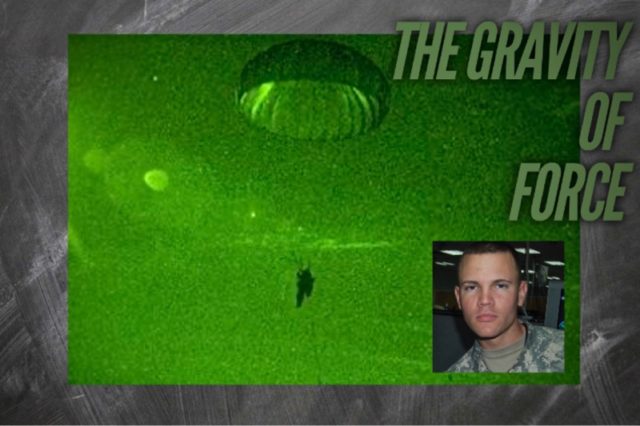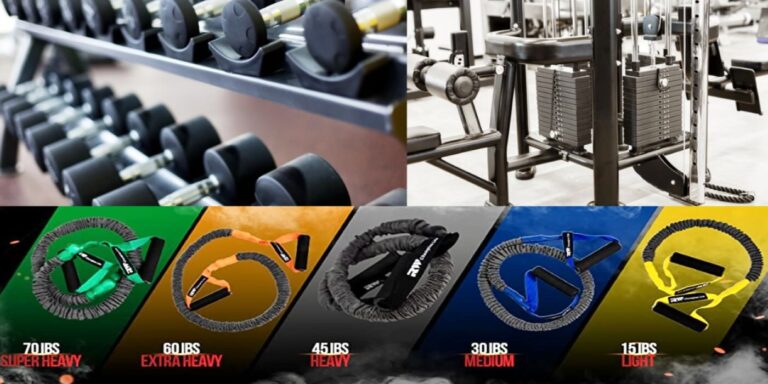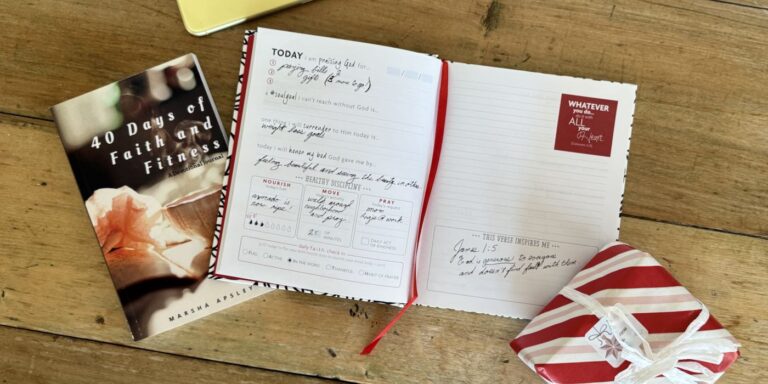CRUNCH TIME
Faith & Fitness Magazine: So let me get this correct, while doing a parachute jump for the Army you fell 200 feet when the thing didn’t deploy correctly. That resulted in many broken bones and sever physical trauma. What is it like to fall 200 feet?
SS Richard Bradley: It is pretty scary. I thought my life was over on the way down. I had just seconds to think, react and have last thoughts. The total altitude for this practice jump was just 800 feet so the chute is normally deployed immediately.
F&F: What was going through your mind and what were the moments like immediately after you hit the earth?
RB: I realized I had a bad exit. I was tangled. My concern was to get untangled and get my equipment off. I had a heavy sack and machine gun attached to me. In focusing on getting untangled, I lost my air and collided with another jumper. That is when it really got bad for me. I started falling even faster. At that point I knew I was going to hit very hard. I braced myself and prayed, “God forgive me.” At the time I knew I wasn’t right with God. I thought that was it for me.
F&F: Was it a pretty good ‘crunch’?
RB: That is a good word to describe it. I landed on my left side, which was the worst thing that could have happened because that is the side where my weapon was. The impact pounded it up into my hip and femur causing it to shatter into eight pieces. I busted my hip, fractured my pelvis, broke two ribs and broke my back. I remember still laying on my left side and trying to twist my upper body so I could lay flat and get my parachute off. I still didn’t know how bad I was hurt. As I rolled my legs didn’t move with me. I could hear the snap, crackle and pop in my back, I could feel the grinding in there.
The medics came over. I could see their mouths moving as they asked me where I was hurt, but I couldn’t hear them. I told them I knew my back was broken and my leg was hurt. I didn’t know how bad it was. I could feel a bulge. Turns out the bone had come out the side of my leg. They cut my clothes and boots off and put me on the stretcher. I remember feeling something wet flowing down my chin. It was blood. I had internal bleeding. I realized I had survived but wondered if I would be ok.
F&F: You must have done plenty of jumps previous to this one. Did you ever think about something like this happening? Was there any training to prepare for such an incident?
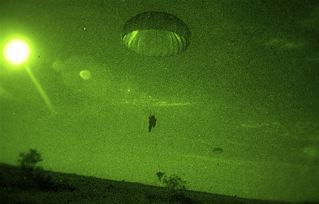 RB: I was still relatively new at it. In review some have suggested I should have pulled the reserve chute and others say I made the right decision – that in my situation the reserve chute would have only caused more problems. It was one of those things that even though you have all the right training you never know what you will do until the situation happens. I made a decision that resulted in injury but that I ultimately survived.
RB: I was still relatively new at it. In review some have suggested I should have pulled the reserve chute and others say I made the right decision – that in my situation the reserve chute would have only caused more problems. It was one of those things that even though you have all the right training you never know what you will do until the situation happens. I made a decision that resulted in injury but that I ultimately survived.
FROM CHILDHOOD TO CHILDREN
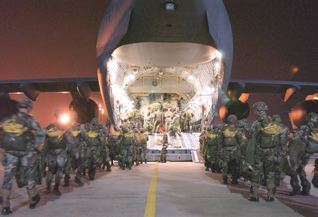 F&F: Let’s back up. Share about why and how you joined the Army? Just a job and a great way to get you college education covered?
F&F: Let’s back up. Share about why and how you joined the Army? Just a job and a great way to get you college education covered?
RB: I joined when I was twenty. I was going to college but I was immature. I was in a relationship with the woman who is now my wife. Together we were having a baby. I started to realize I had been having too much fun. I needed to be responsible in my relationship with her and take care of my child. I joined the Army so I could have some security, still working on college but provide for my family.
F&F: And share a bit about your life prior to that. What was life like for Richard Bradley as a youth?
RB: I was brought up in a Baptist church. My dad was in the Army too. He was never really around. He had hardship tours where he went but the family didn’t. My mom was pretty much the mom and dad in my life. She kept us in church. I can’t complain about my childhood. My mom did the best she could for us. Considering that I was brought up in the military environment, I did fairly well.
F&F: Your son, I understand, was a big motivation in your recovery. What is it like being a dad?
RB: It is great. We actually have three children now. They have been a real motivation to me. After the temporary paralysis set in and I couldn’t feel my legs, I thought, “Man I’m not going to be able to play football with my son. I’m not going to be able to do anything with him.” After the surgeries during the therapy my children were indeed a motivation for me. I remember telling myself as a way to push through the pain, “I want to be involved with my kids and be more to them than a couch potato.”
A TOUGH BREAK
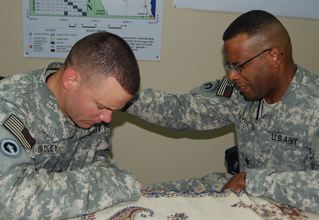 F&F: Your faith in God was another big factor. I mean it must have played a major role for the Army to recognize it. How did you draw on your Christian faith after the accident?
F&F: Your faith in God was another big factor. I mean it must have played a major role for the Army to recognize it. How did you draw on your Christian faith after the accident?
RB: In every situation I didn’t personally. For example, the night of the accident while they were resetting the bone in my leg they couldn’t risk my blood pressure going lower by giving me any pain relievers. Instead, the chaplain, Lieutenant Colonial Lance was there to hold my hand. I didn’t know who he was at the time – I hadn’t attended any of his services. What I do remember is that I was yelling and cussing all kinds of profanity to him. He told me it was going to be ok.
Days later, I was scheduled for major surgery. At the hospital, after I had said my goodbyes to my family the staff was wheeling me into the operating room. I asked them to stop in the hallway – I wasn’t ready. I had been raised in church all my life but I didn’t know Christ as my savior. I was scared. A chaplain came and prayed with me. I accepted Jesus and the saving grace of God. It was then that I committed my life to God.
Since then I’ve grown closer to God realizing the full worth of the life he has given me. It took a horrible accident for me to realize my need for Him. I was arrogant and full of myself, “I’m a PT stud. I’m strong. I don’t need anybody.” I tell people that he allowed me to break my back to save my life.
RECOVERY AND COMMITMENT
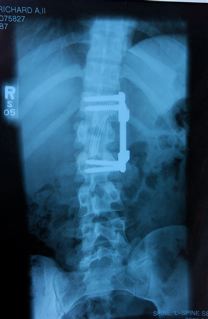
F&F: What was life like after the initial hospital time?
RB: The Army did both leg and back surgery over two months. During that time I did a few therapy sessions using a walker. Then they sent me home in a wheelchair.
At home I had a shower chair, a special toilet adapter and more. I relied heavily on my wife to get dressed, cleaned and even go to the toilet. She said it was like taking care of another child. After a while it became too much for her. She needed a break, left and went to stay with her family. I didn’t know if she would come back.
One night I prayed to God, “Take my life while I’m sleeping. I don’t want to live life like this where everyone has to take care of me.” God didn’t do that and I became determined to do whatever it took to walk and be active.
Fortunately my wife did come back. We went back to the hospital to talk with the chief orthopedic surgeon. He told us that my career in the Army was over. I would never recover from my injuries. I would never be able to walk well with a permanent limp relying on a cane.
The next step was for them to have me reviewed by a medical board and chapter me out of the military. They weren’t being mean to me. People just don’t stay on active duty with those kinds of injuries. I was in denial. I refused to accept that. After all, I had prayed and sought God. We were able to get the decision postponed to allow reasonable time for me to recover and get second and third opinions. Through additional surgeries, therapy and motivation through my faith and family I didn’t have the limp anymore.
The medical board never happened! I took the Army PT test and passed it.
F&F: It sounds, however, like you marriage was under stress?
RB: Before the accident we were both in a rather worldly state of living. We loved each other but we didn’t love God the way we should. We knew about God and went to church but we weren’t saved. Even after she came back a couple months later there was still a lot of turmoil in our relationship. We were both insecure. That went on for more than a year. It was trying for both of us.
The turning point was when our church had a marriage seminar. It was a week long taking us through baby steps of how we could love God and each other more. I remember that on day four she too made a commitment to Christ.
A TOUGH TEST
F&F: So, your marriage was growing stronger in Christ along with your physical body growing stronger. The Army figured you would not pass the physical fitness test? It must be a tough test?
RB: The requirements are different depending on your age and gender. For me it was seventy-eight pushups in two minutes, eighty-two sit-ups in two minutes and a two-mile run. 300 is a perfect score. Before the accident I was breaking that. Since the accident on my most recent test I made 297.
F&F: That sounds like nearly a perfect score. Share about the training that led up to that and then describe doing the actual test.
RB: All the doctors were telling me that I shouldn’t even be doing this due to the effect of the hard impact from running and exercise on the hardware in my body. Rather than totally blowing off that warning, I did all kinds of cardio exercise that would not have impact. I did things like an elliptical trainer, biking, resistance training with my legs, the rowing machine and other exercising.
Like a lot of guys I used to be big into using free weights. I didn’t like using weight machines. However, I’ve come to respect them because of their design and the support they give in having proper form. This is particularly helpful in strengthening my back that especially needs good support.
I did a few practice PT tests before the actual test. My trainer, though he couldn’t start the race with me, ran ahead of me coaching me along the whole time. Like the classic drill-sergeant image he would yell, “Remember when you couldn’t do anything! Those doctors told you that you were worthless. Get your tail up there.” He reminded me of how hard it was to get there. I was just trying to catch him.
THE FORCE TO RUN INTO THE FUTURE
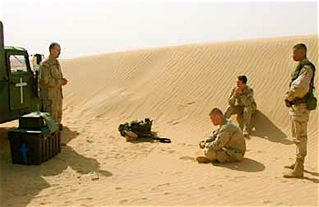
F&F: You are part of our nation’s military force. You had your life changed by the force of gravity – something that was really out of your control. Then you forced yourself to achieve top physical performance. How has the concept of “force” evolved for you and how has God changed your definition of “force”?
RB: I initially think of force as a power that compels me to do something against my will. That is akin to a concept in the military that we sometimes use force to deal with a situation. Through this accident I now have a better understanding of the force or authority of God. It is the strength and power to do something greater than what we think is achievable.
F&F: Do you think it takes a dramatic or tragic incident for people to push themselves harder?
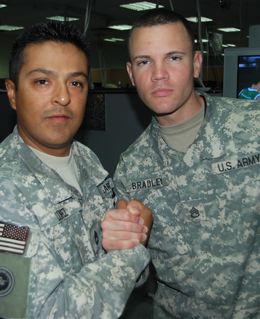 RB: It doesn’t take that for everyone. In fact through the sharing of my story people are finding the encouragement to push themselves harder. They are learning from my tragedy. That is particularly true among my fellow soldiers. I’ll prod some of them along while we’re doing PT training. Later, I’ll show them my scars, share my x-rays and tell them my story and they’ll say, “I didn’t realize. Man, I’ve got to step up my game.”
RB: It doesn’t take that for everyone. In fact through the sharing of my story people are finding the encouragement to push themselves harder. They are learning from my tragedy. That is particularly true among my fellow soldiers. I’ll prod some of them along while we’re doing PT training. Later, I’ll show them my scars, share my x-rays and tell them my story and they’ll say, “I didn’t realize. Man, I’ve got to step up my game.”
What does it take to “give more” of yourself physically, spiritually and in your personal relationships?
RB: It takes a strong foundation of support. No matter how strong you think you are you can’t do it alone. You need someone (and I think you need God too) to be able to give more of yourself beyond your own abilities. To continue going forward when you feel like giving up, you have to get a greater strength from God and your family.
F&F: You are a distance runner?
RB: I ran in high school and college. I would run to work. It was a chance for me to clear my mind. I love to run.
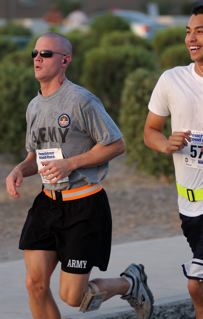
F&F: So, how do your fellow soldiers respond to this? I suspect some see you as a show-off trying to prove something. Perhaps others even feel you are a threat that will overshadow their hard efforts and strength. I wonder also if some aren’t totally turned off by your faith too?
RB: I haven’t come across anyone like that. Most of them actually are quite positive. They give me nicknames like Iron Man or Bionic Man. These days everybody in the military knows somebody that has been injured. Sometimes my faith strikes an interest in others and other times I can tell they are not interested.
F&F: How do you get involved in the lives of others?
RB: I consider myself to be soft-spoken. Over this last year I’ve been trying harder to share my story and encourage others when I workout and when I’m at work.
F&F: What’s next? What plans do you have? Has God been giving you any sneak peak into the opportunities that lie before you?
RB: Back in 2003 I thought about going to officer school. I have put in an application now to become an officer. My goal for the future is to stay in the military, be a commissioned officer and be in a different position where I can mentor soldiers from a different standpoint.
F&F: Short of skydiving what big adventure would you like to do with your sons someday?
RB: I’m a fisherman. I remember going deep-sea saltwater fishing with my dad on a big boat when I was fourteen. It has always been a dream of mine to get back out there. To me that is an adventure. It isn’t an adrenaline rush like skydiving but my boys and I like to go out fresh water fishing. So, I’d like to get them out in the ocean on a big boat for a day or two. I’m a very outdoors guy, so I want to get them out there with me.

